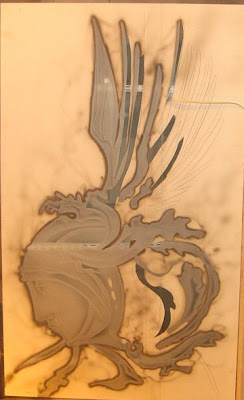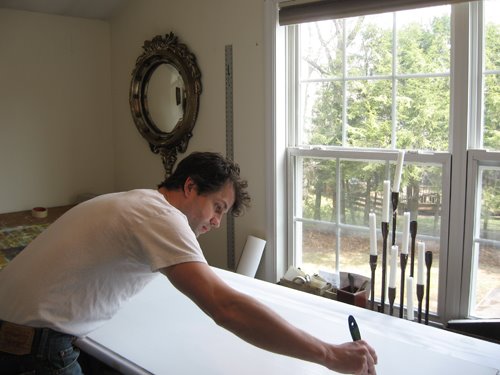 Here is a photo I took from my truck of a lady in Brooklyn---She is a distinctly NewYork/ Brooklyn character.
Here is a photo I took from my truck of a lady in Brooklyn---She is a distinctly NewYork/ Brooklyn character.
Saturday, March 29, 2008
brooklyn lady
 Here is a photo I took from my truck of a lady in Brooklyn---She is a distinctly NewYork/ Brooklyn character.
Here is a photo I took from my truck of a lady in Brooklyn---She is a distinctly NewYork/ Brooklyn character.
agony

Here is the piece that made me a day late on my deadline. (It is on its side for working purposes.) It is a piece of glass 3 feet by five foot. Missing deadlines is a rare and horrible feeling for me. It happens. On the bright side, the final finished piece is something worth looking at, methinks...exhausted
done and done
Thursday, March 27, 2008
words of the day---rupert brookes
III. The Dead
- Blow out, you bugles, over the rich Dead!
- There's none of these so lonely and poor of old,
- But, dying, has made us rarer gifts than gold.
- These laid the world away; poured out the red
- Sweet wine of youth; gave up the years to be
- Of work and joy, and that unhoped serene,
- That men call age; and those who would have been,
- Their sons, they gave, their immortality.
- Blow, bugles, blow! They brought us, for our dearth,
- Holiness, lacked so long, and Love, and Pain.
- Honour has come back, as a king, to earth,
- And paid his subjects with a royal wage;
- And Nobleness walks in our ways again;
- And we have come into our heritage.
tibet
hope and monday morning
contour pillows, cheese and fox news
finished piece
layout
 Here is what the logo looks like. What you are seeing is rubber material on glass and the letters have been removed (waiting to be sandblasted.) Luckily both of these pieces are done--- I am digging through past a bit to show process. The Logo is surrounded by a bunch of art nouveau "organics" that I designed. The original Logo design was made by brian christi.
Here is what the logo looks like. What you are seeing is rubber material on glass and the letters have been removed (waiting to be sandblasted.) Luckily both of these pieces are done--- I am digging through past a bit to show process. The Logo is surrounded by a bunch of art nouveau "organics" that I designed. The original Logo design was made by brian christi.
update

I am still mired in deadlines but I am closing in (like a fly to a windshield.) Pictured above is one of two pieces of glass eight foot by three foot--- half inch thick pieces of glass I am carving to go on the side of a stair as you enter the location. These pieces are very heavy and hard to work with but I have finished them and will deliver today. I must then return to carving my woman. I have a meeting with a magazine today at four I must attend so the pressure is really on as the place opens tomorrow. It doesnt look like glass because it is covered in rubber..FYI.
Wednesday, March 26, 2008
glass update
Tuesday, March 25, 2008
quote of the day---bible
update
a thing well framed...

alex is very happy when collectors of my work get my paintings framed and framed well. Framing is a nebulous art like reading foreheads or tarot or palms. I often agonize over framing (and not just over the cost of framing.) Here is a painting on glass I made--- I believe it was titled "On a Pale Horse." Google will help you find out the meaning of this piece. This piece is hanging happily in a home in colorado. I came home so stressed from deadline torture and this email made me see light again. Viva Something! It has become clear to me that the average person is not adept at photography but that is fine as kmart will fix you up with some fine photos for $4.99.
gardega's medusa
Bocklin's medusa

As much as I like bocklin I must say that this medusa is an utter mess and a failure of a painting and when I saw it when I was twenty I decided I could do better and tried to make a better medusa (see above entry) it is up to you if I succeeded . This painting looks like she ate bad chicken and the snakes dont seem to be a part of her. (They should have fired the plumber and brought in gardega plumbing.)
a
artist of the day---arnold bocklin

Bocklin is one of my favorite artists as he is technically very skilled but he still manages to keep a great air of mystery about his works without feeling "forced" there are those who would call home kitsch but I promise you they are either non-artists or slop-artists who think jasper johns is a genius.
Arnold Böcklin was born on October 19, 1827 in Basel, Switzerland and died on January 16, 1901 in S. Domenico in Fiesole. After completing his studies between 1845 and 1847 under the tutelage of Johann Wilhelm Schirmer in Dusseldorf, Böcklin travelled to Rome in 1850 where he made the acquaintance of Oswald Achenbach and Anselm Feuerbach. In 1855 he returned to Basel as a portrait and landscape painter. In Munich during 1856-57, the painter caught the attention of King Ludwig I as well as that of Adolf Friedrich Graf von Schack, who purchased 14 of his paintings. He was appointed Professor of Landscape at the Weimar School of Arts in 1860, a position he held for two years before travelling again to Rome, and then back to Basel in 1866. After these stays in Weimar, Rome and Basel, Böcklin returned again to Munich in 1871. In 1874 he relocated to Florence where he became associated with a group of artists linked with Adolf von Hildebrand and Hans von Marées, and then in 1876 he settled in Munich. From 1885 to 1892 he lived near Zurich.
Böcklin's work was quite popular during his time, and he was able to support a large family and lifelong career; a contract with the Berlin art dealer Fritz Gurlitt in 1880 helped to secured this existence. Originally devoting himself to landscape painting, as early as 1860 mythological references and symbolism began to permeate Böcklin's work, and gave us the pieces with which we are most familiar today.
Monday, March 24, 2008
good morning and happy monday
Sunday, March 23, 2008
infinity (as I see it)
Leonardo on perspective
What qualities does Leonardo claim for his own art in contrast to that of others? Why does he feel that perspective is important?
Introduction
Because I can find no useful or pleasant subject to discourse on, since the men who came before me have taken all the useful and pleasant subjects and discoursed on them at length, I find I must behave like a pauper who comes to the fair last, and can provide for himself in no other way than to take those things of trivial value that have been rejected by other buyers. I, then, will fill my shopping bag with all these despised and rejected wares, trash passed over by previous buyers, and take them and distribute them, not in the great cities, but in the poorest villages, taking whatever money might be offered.
I realize many will call my little work useless; these people, as far as I'm concerned, are like those whom Demetrius was talking about when he said that he cared no more for the wind that issued from their mouths than the wind that issued from their lower extremities. These men desire only material wealth and are utterly lacking in wisdom, which is the only true food and wealth for the mind. The soul is so much greater than the body, its possessions so much nobler than those of the body. So, whenever a person of this sort picks up any of my works to read, I half expect him to put it to his nose the way a monkey does, or ask me if it's good to eat.
I also realize that I am not a literary man, and that certain people who know too much that is good for them will blame me, saying that I'm not a man of letters. Fools! Dolts! I may refute them the way Marius did to the Roman patricians when he said that some who adorn themselves with other people's labor won't allow me to do my own labor. These folks will say that since I have no skill at literature, I will not be able to decorously express what I'm talking about. What they don't know is that the subjects I am dealing with are to be dealt with by experience (1) rather than by words, and experience is the muse of all who write well. And so, as my muse, I will cite her in every case.
Although, unlike my critics, I am not able to facilely quote other writers, I will rely on an authority much greater and much more noble: on Experience, the Mistress of their Masters. These fellows waddle about puffed up and pretentious, all dressed up in the fruits, not of their own labors, but of other people's labors; these fellows will not allow me my own labors. They will scorn me as an inventor and a discoverer, but they should be blamed more, since they have invented and discovered nothing but rather go about holding forth and declaiming the ideas and works of others.
There are men who are discoverers and intermediaries and interpreters between Nature and Man, rather than boasters and declaimers of other people's work, and these must be admired and esteemed as the object in front of a mirror in comparison to the image seen in the mirror. The first is a real object in and of itself, the second is nothing. These people owe nothing to Nature; it is only good fortune that they wear a human form and, if it weren't for this good fortune, I'd classify them with the cattle and the animals.
There are many who would, with reason, blame me by pointing out that my proofs are contrary to established authority, which is, after all, held in great reverence by their inexperienced minds. They do not realize that my works arise from unadulterated and simple experience, which is the one true mistress, the one true muse. The rules of experience are all that is needed to discern the true from the false; experience is what helps all men to look temperately for the possible, rather than cloaking oneself in ignorance, which can result in no good thing, so that, in the end, one abandons oneself to despair and melancholy.
Among all the studies of natural causes, Light more than anything else delights the beholder, and among the greatest features of Mathematics is the certainty of all its demonstrations which more than anything else elevates the mind of the thinker. Therefore, perspective is to be preferred to all other discourses and systems of knowledge, for in this science the ray of light is explained using methods of demonstration which glorify both Mathematics and Physics and grace the flowers of both these magnificent sciences. But since the axioms of Perspective have been treated extensively, I will abridge them, arranging them in their natural order and the order of their mathematical demonstration. Sometimes I will deduce the effects from their causes, and sometimes I will induce the causes from the effects, while adding my own conclusions that might be inferred from these.






